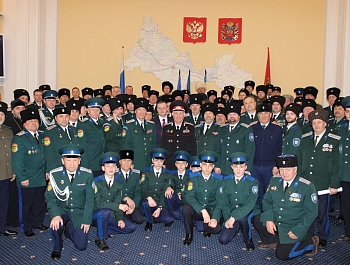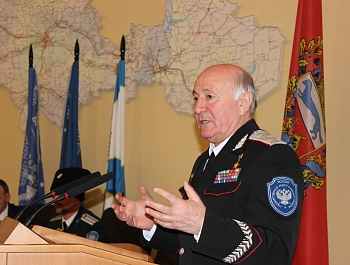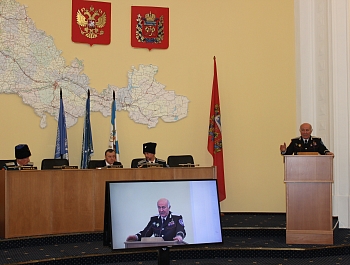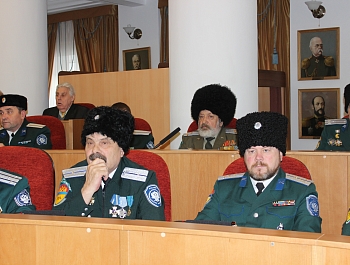During a working trip, Nikolai Doluda visited a Cossack school, met with the leadership of the region, took part in the opening of the Cossack trade and industrial center “Cossack Compound”. This is the first Cossack enterprise that will be engaged in the cultivation and processing of agricultural products.
According to the chieftain of the First Division of the Orenburg Cossack Army Sergey Slepov, the enterprise will open jobs for Cossacks in late February. The commercial and industrial center will be engaged in the processing and sale of agricultural products. To date, about 64 million rubles have been invested in the organization. Of these, 18 is a grand from the regional budget, the remaining funds were collected by Cossack entrepreneurs.
- We have already opened a store, obtained a license to trade. Contracts for the supply of products were signed with ten farmers. There is a deboning shop, equipment for baking, a smoked meat machine small, but the productivity is 200 kg per shift. These are dumplings, and dumplings, and khinkali, - Sergey Slepov told. - In the near future it is planned to open a round-the-clock cafe, things are moving, as they say, on the thumb, because in Yekaterinburg the Cossacks already have such a practice. Special equipment purchased for 2 million rubles. Chelyabinsk, Ufa work on the same machines. The total area of the hypermarket is 700 square meters. It differs from chain stores in that there will be environmentally friendly products made by Cossack farmers and their families in the Orenburg region. Most of the meat, poultry in raw and smoked form, lard of various preparations, sausages, cheeses, dairy products.
Having visited the first Cossack enterprise, Nikolai Doluda noted that it is an example to follow for all troops.
- To date, the situation has developed in such a way that regional and municipal authorities provide financial assistance to almost all Cossack societies, however, this is not enough, - Nikolai Alexandrovich believes. - Any Cossack society should have its own economic base. That is why we fought so hard to change the land code of the Russian Federation, and in 2015 we achieved this. Now, land can be allocated to the registered Cossack troops without bidding. And what I liked in the Orenburg region - here we go further! A regional law has been adopted here, which allows to allocate land not only for agricultural land, but also within the boundaries of settlements for agricultural processing. There is no such experience in organizing additional income for Cossack societies in any region, and I will talk about this in all registered Cossack troops.
Service improvement
Nikolai Doluda also participated in a meeting of the Council of Atamans of the First Division of the Orenburg Cossack Army.
- The management set a task for me - to travel around all the registered Cossack troops and see how the state service of the Cossacks and the system of patriotic education of the younger generation are organized on the ground. Everywhere things are different, and it all depends on how much the local authorities are interested in the development of the Cossacks, ”says Nikolai Doluda. - Today I became convinced that the municipal authorities allocate material assistance to almost all Cossack societies. But this is not enough. Any Cossack society should have its own economic base. Land is the real estate that makes a profit. It's great. The Orenburg Cossack army has every chance of becoming one of the best operating Cossack registry troops in the country, ”Nikolai Doluda said at a meeting of the Ataman Council.
Despite a good assessment of the work of the Orenburg Cossacks, the chieftain noted the absence of their own headquarters.
- I saw the conditions in which the chieftain of the First Division of the Orenburg Cossack Army works, and I evaluate them extremely negatively. Having been in other troops, I have not met anywhere so that the chieftain of the department, where about five thousand Cossacks, was placed in two offices. The Orenburg Cossack society is located on the territory of five constituent entities of the Russian Federation, four of which are some kind of donors with great potential in providing assistance, the chieftain emphasized.
Nikolai Alexandrovich said that 15 thousand Cossacks for such a strong Cossack organization are very few, should be at least twice as many.
The chieftain paid particular attention to compliance with the norms of wearing uniforms and the insufficient level of organization of the Cossack education system. Indeed, in the region where the historical Cossack roots, there is only one Cossack school and there is not a single Cossack cadet corps.
- One of our main tasks is the struggle for youth. You perfectly understand that if parents, a school, and, to a lesser extent, a street were engaged in raising the young generation, now, unfortunately, things are different. Many children are brought up in single-parent families, the school, alas, does not have the previous authority, and the Internet and the street fill most of the information space. This information is not always useful, the child is not always able to analyze it and draw useful conclusions, - Nikolay Doluda is convinced. - Often, young people are looking for aggression on the Internet, with the aim of making easy money, they get to sites related to fraud. I am by no means against the Internet, as such, we live in an age of high information technologies that are of great benefit, but you need to use it wisely. And traditional education of youth depends on Cossacks.
According to the ataman of the All-Russian Cossack society, the more children will be involved in the Cossack education system, where along with general education subjects are studied the history, culture, traditions and customs of the Cossacks, the more true patriots and morally healthy personalities will grow in our country.
- It is in the system of Cossack education that we lay in the children the main universal principles: respect for elders, love for the Fatherland, to help those in need. It is an honor, conscience, duty and readiness at any moment to defend one’s country, ”says Nikolai Doluda. - By the way, in the educational system of the Kuban Cossack Army, where I was the chieftain for 12 years, there are already more than 100 thousand children who joined the ranks of the Cossack Youth Union. I want to wish you the same result, because children are the key to the future of our Motherland.
New vector of development
At the end of the official part of the meeting of the Council of Atamans, Nikolai Doluda continued the conversation with the Orenburg Cossacks. Vladislav Bondarenko, the chieftain of the Orenburg department of the Union of Cossacks of Russia, asked about the attitude of Nikolai Alexandrovich to public Cossack organizations.
- One of the tasks that are set before me, as the ataman of the All-Russian Cossack Society, and which, at the same time, are approved in our Charter by the President of Russia, is the organization of interaction with public Cossack associations. And I will be obligatory engaged in this direction, - said the military chieftain. - Yes, you do not assume obligations to perform public service, but you are the same Cossacks, like us, you also follow traditions and we have a lot in common, we live in one country. Together we want to engage in the patriotic education of the young generation, improve the system of continuous Cossack education, integrate Cossack traditions and culture into the modern life of society, hold memorials, at which we remember those who fought during the Civil and Great Patriotic Wars. There are so many things that unite us and we don’t need to be on opposite sides of the barricades. On the contrary, we need to go shoulder to shoulder. After all, there are 180 thousand registered Cossacks today, and 650 thousand social activists. Just imagine what kind of power and support the state is!
At the end of the topic of the unification of the Cossacks of Russia, Nikolai Alexandrovich raised the question of the geopolitical situation.
- Unfortunately, somewhere there is still an opinion that American democracy is the best in the world. And what is it? It turns out that she brings discord. In the previously stable countries where this democracy is reaching, local conflicts are beginning to occur, which naturally affect not only the lives of the inhabitants of these states themselves, but also the situation in the world as a whole. Among such countries, as you know, Yugoslavia, Iraq, Libya, Ukraine, the military chief recalled. “Many are trying to get us on our knees.” But no country has yet been able to do this and cannot. I’ll quote the lines of one famous poem: “We are Russians and let the enemy remember forever that only then we get on our knees when we kiss the Russian flag!”
After the speech of Nikolai Alexandrovich, the Cossacks perked up. Ataman of the North-Western Yurt Cossack Society Anatoly Aldukhov thanked the chieftain for his support.
- We are glad that you have arrived, now we have faith in the Russian Cossacks! We are ready to fulfill all your orders. And thank you for your kind words, for believing in us, ”Anatoly Aldukhov addressed the chieftain. - We will do everything to ensure that the Orenburg Cossack army really reaches a new level of life for the Russian Cossacks.











































